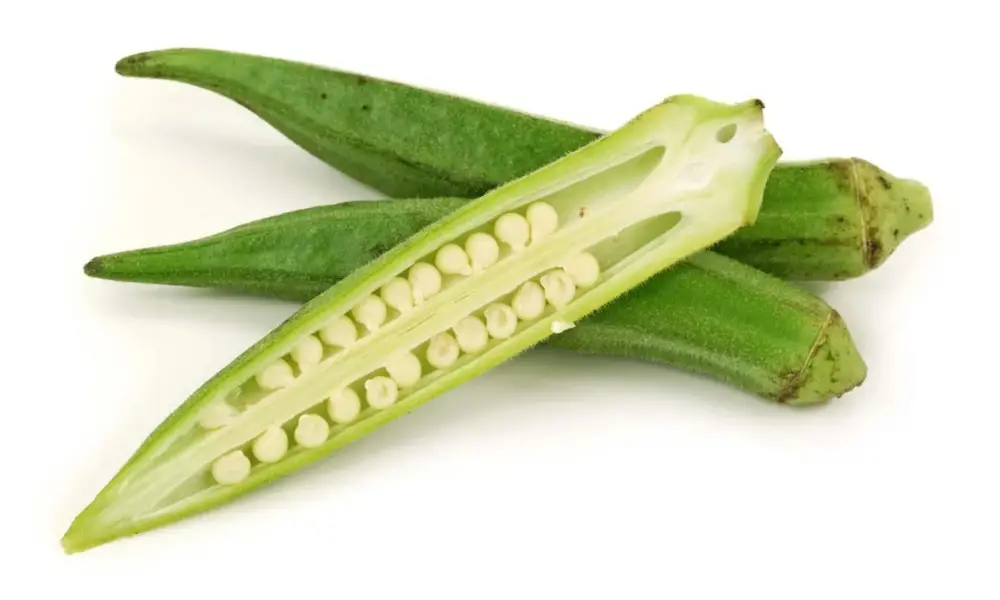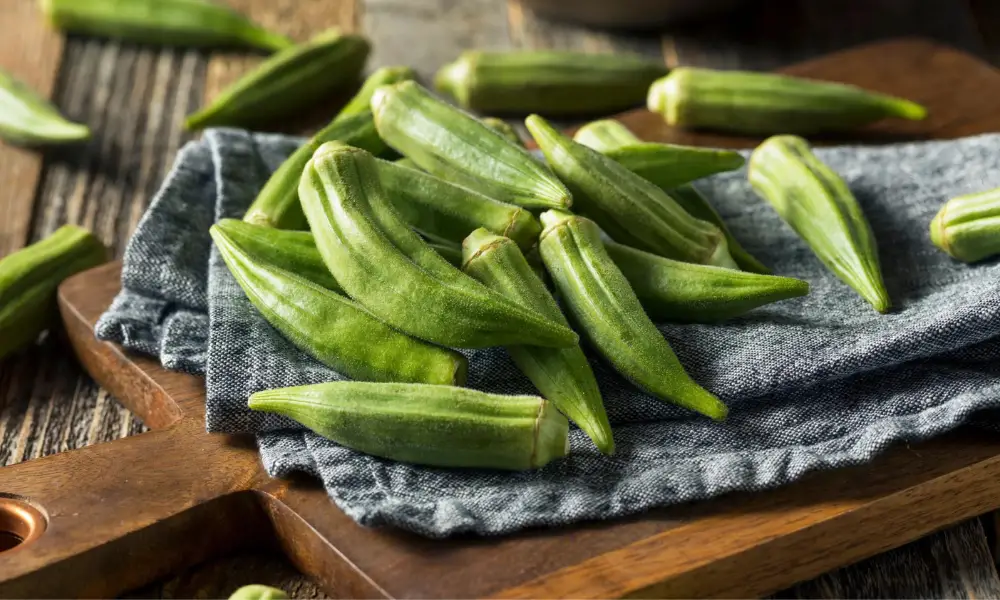Freezing okra for later use is a quick and easy technique to keep this vegetable on hand in the kitchen long after the hot summer months that okra adores!
Okra has numerous uses; freezing is a great way to make them last longer. Here are some tips to get you started. First, chop and blanch the okra. Then, fry or bread the okra. Thaw it in the freezer before serving when you are ready to serve it.

How to Freeze Okra?
After washing, cut off the stems with a sharp knife, being cautious not to cut into the seed cell. Add pods to boiling water to blanch okra. Small pods take three minutes to steam; giant pods take four. Pods can be quickly cooled by submerging them in ice water for the same time they were boiled. There are various methods for freezing okra after it has cooled.
- Put full pods in freezer bags or other airtight containers. Or, slice the pods in half before freezing. You may also quickly freeze individual pods or pieces for either approach by arranging them on a tray coated with parchment paper and putting the tray in the freezer for a few hours.
- Put them in freezer bags after they have been frozen. After blanching the okra, cut the pods in half crosswise and coat them in cornmeal or flour if you intend to cook them later. Before putting slices into freezer bags, freeze them on a tray lined with parchment paper.
- Okra that has been blanched and frozen is tasty when boiled, stewed, smothered, or fried. Whole pods are typically the simplest and most straightforward to freeze, and they are simple to prepare afterward. Okra pods should be allowed to thaw before being cut crosswise partially.
- Before freezing, many Southern cooks like to slice, toast, bake, or fry okra. Slices can be baked by placing them plain or breaded on a pan and baking them for 20 minutes at 300 degrees. Okra should be turned once halfway through baking. Slices of okra can be either plain or breaded and fried in heated oil on a skillet. Stirring occasionally, cook for six to eight minutes over medium heat. Before storing the prepared slices in freezer bags or containers, quickly freeze each slice on parchment-lined pans. Heat these slices in a skillet or oven to use.
- Don’t completely vacuum-seal your pouches if you have a vacuum sealer to avoid crushing the okra. This is particularly true if you cut the okra into slices and breaded it before freezing. Use whole frozen okra within a year and chopped pods within nine months for the greatest flavor.
What are the Health Benefits of Okra?
Okra may be included in your diet in various ways and is frequently used in soups, stews, and in many Southern cuisines, including gumbo. Okra’s mucilage causes it to become slimy or slippery when heated. To prevent the okra from having a sticky texture, cook it over high heat in a big skillet. Pickle okra to reduce its sliminess.
Healthy Heart and Brain
By preventing blood clots and minimizing free radical damage, polyphenols minimize your chance of developing heart disease and stroke. Antioxidants found in okra may benefit your brain by reducing inflammation.
Okra contains mucilage, a dense, gel-like substance that can attach to cholesterol and carry it through the body after digestion. Blood cholesterol levels decreased eight weeks after rats were given a high-fat diet containing okra powder.
Reference: Nutritional Quality and Health Benefits of Okra (Abelmoschus Esculentus): A Review
Blood Sugar Control
Numerous studies have shown that okra can help control blood sugar levels. Researchers believe that okra may help reduce sugar absorption during digestion.
In one experiment, rats received purified okra and liquid sugar, and their blood sugar spikes were less than those of the control group. Okra’s ability to assist people to manage their blood sugar levels needs further study.
During Pregnancy Support
15% of the recommended daily intake of folate, a crucial nutrient for pregnant women, is found in okra. The neural tube defects that impair the developing fetus’s brain and spine can be avoided with folate.
Abundant Antioxidants
Okra has a lot of antioxidants that are good for your health. Dietary components known as antioxidants offer defense against dangerous molecules called free radicals. The most effective antioxidants in okra are polyphenols, which include flavonoids, isoquercetin, and vitamins A and C. Diets high in polyphenols have been found to improve heart health by reducing the risk of blood clots and oxidative stress.
Because they can get to the brain and fight inflammation, polyphenols may potentially improve brain health. These defense mechanisms might improve cognition, learning, and memory while protecting your brain from the effects of aging.
Anti-Cancer Features
Lectin, a kind of protein found in okra, may inhibit the development of human cancer cells. In a test tube study using breast cancer cells, the lectin in okra reduced the growth of cancer cells by up to 63 percent. In a different test tube study, okra extract induced cancer cell death in metastatic mouse melanoma cells. Remember that all tests used test tubes with concentrated and extracted okra components. The more human study is needed before conclusions may be drawn.
Does Okra Benefit Your Digestive System?
The insoluble fiber in okra lubricates the large intestine and maintains the health of your digestive system. The fiber in okra feeds your good bacteria, which helps to maintain a healthy digestive system. You’ll consequently have fewer cramps, bloating, and other stomach problems. Okra extracts have increased high-density lipoproteins (HDL: “good” cholesterol) levels while decreasing circulating triglycerides and free fatty acids. These findings suggest that eating okra can aid cholesterol control and colon cleansing.
Okra also contains vitamin K, which helps with blood clotting, and vitamin C, which supports immune system health. Antioxidants are organic compounds that help your body fight off free radicals, which can harm cells. Okra is fantastic prebiotic food and a high-fiber, stomach-friendly vegetable. Okra’s fiber soothes the lining of the stomach. Peptic ulcers are avoided by keeping Helicobacter pylori from sticking to the gastric mucosa.
Is Eating Okra Cooked or Raw Preferable?
Even raw okra pods can be consumed. The healthier it is for you, the less cooked the okra is. Despite having few calories, kohlrabi is packed with nutrients and is high in fiber, folate, antioxidants, and vitamins A and C. Okra also contains vitamin K, which helps with blood clotting, and vitamin C, which supports immune system health. Antioxidants are organic compounds that help your body fight off free radicals, which can harm cells. Some individuals consume it raw.
Okra is a rich source of iron, calcium, and vitamins A and C. Because it contains Thiamine, Riboflavin Folate, Magnesium, and Potassium, it is the best food to eat in the first trimester of pregnancy. Additionally, it is said to increase your sexual urge! Okra is a good source of folate, providing 15% of a woman’s daily needs in just one cup (100 grams). Summary Okra consumption may help pregnant women fulfill their daily folate needs. Folate is essential for preventing neural tube abnormalities.
Does Okra Help Lower Cholesterol?
In an eight-week experiment, mice were divided into three groups and given either a high-fat diet without okra powder or a high-fat diet with one percent or two percent okra powder. Compared to the control group, the mice on the okra diet had lower total blood cholesterol levels and expelled more cholesterol in their feces. Okra was shown to lower cholesterol in diabetic lab mice. People with diabetes are advised to eat foods high in fiber and antioxidants because these nutrients help lower cholesterol.
Overeating okra may be harmful to certain people. Fructans, a carbohydrate that can upset the stomach, are present in okra. Fructans may cause diarrhea, gas, cramps, and bloating in people with digestive problems. Oxalates are abundant in okra and can result in kidney stones.
Are Persons Who have High Blood Pressure Helped by Okra?
Vegetables and Fruits are rich sources of potassium and magnesium, which help lower blood pressure. Magnesium levels are high in black beans, okra, spinach, pumpkin seeds, and squash seeds. The creation of bile juice in the intestines is altered by fibers, which lowers blood cholesterol levels. Okra also contains a lot of magnesium, which helps the body regulate and control blood pressure. Okra and metformin, a common diabetes medication, can interact, though.
Patients taking this medication should therefore refrain from eating okra. Summary Consuming okra has been associated with better blood sugar regulation. Nevertheless, evidence indicates that it might interact with frequently given diabetes medications. Okra is rich in antioxidants, vitamins A and C, and other nutrients that protect against dangerous diseases like cancer, diabetes, heart disease, and stroke. Additionally, rich in the following nutrients are okra: Magnesium.
Is Okra Helpful for Weight Loss?
Numerous antioxidants in okra water may aid in weight loss and blood sugar regulation. According to the United States Department, a 100-gram of bhindi (okra) contains 33 calories, 7.45 grams of carbs, 1.93 grams of protein, 0.19 grams of fat, and 3.2 grams of fiber of Agriculture (USDA).
Those wanting to reduce weight can benefit greatly from the fiber content. Collagen and vitamin C are abundant, which are crucial for maintaining healthy skin.
One of the benefits is having skin that looks healthy and has fewer fine lines and dark areas. Okra’s antioxidant properties also help to reduce skin and bodily irritation. According to experts, the best time to optimize the health benefits of okra water is first thing in the morning, at least 30 minutes before eating. It’s important to note that not much research has been done on the health advantages of okra water.
What Flavor does Okra have?
Okra has a crisp, juicy, or rich, creamy texture, and its sweet, green flavor intensifies with cooking time. Okra has a unique flavor and texture, but some people liken it to eggplant or green beans because of its mild flavor. Many soups and stews can be made without okra by substituting the two vegetables. Cornstarch or flour can be used as a substitute for the okra’s natural ability to thicken. A plant called okra is frequently used in Southern cooking.
Okra has an earthy flavor that is a cross between asparagus and green beans. It is also known as lady’s fingers because the pods are long, slender filaments that resemble fingers. Okra has a mild flavor with hints of sweetness and green. It has a flavor that falls halfway between an eggplant and a green bean, but like with other foods, as soon as it is fried, its flavor is subdued and replaced by a crunchy, seasoned batter.
Conclusion
When it comes to freezing, okra is a versatile vegetable that can be frozen for future use. To prepare it for freezing, okra is cut into strips about 1/4 inch thick. After cutting, the okra is dredged in a mixture of cornmeal and flour, then popped into a single layer on a baking sheet. Once frozen, okra is ready to be reheated whenever desired.
